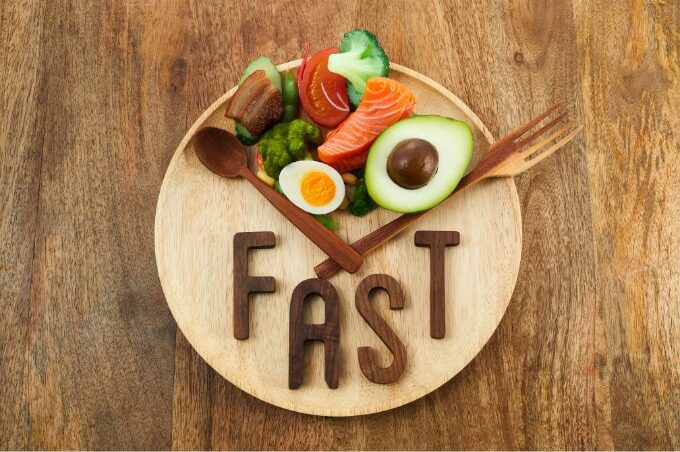Intermittent fasting (IF) has become one of the most popular wellness trends, with promises of weight loss, improved metabolic health, and longevity. While it can offer many benefits, the approach to fasting isn’t a “one-size-fits-all”—especially for women. High-achieving women often face unique challenges with stress, hormone imbalances, and burnout, which can affect how they respond to intermittent fasting. In this post, we’ll unpack what intermittent fasting really means, how it can impact women’s health, and tips for using this tool safely and effectively.
The Benefits of Intermittent Fasting
Intermittent fasting can be a powerful tool for boosting metabolic health, improving insulin sensitivity, and supporting cellular health. Research suggests that it may help with:
- Blood sugar regulation: Fasting periods allow insulin levels to drop, which can improve blood sugar control and reduce insulin resistance.
- Weight management: Fasting helps reduce calorie intake, and the metabolic effects of fasting can support fat loss.
- Cellular health: Fasting triggers autophagy, a process where the body clears out damaged cells, which supports cell renewal and longevity.
- Reduced inflammation: Fasting can help regulate inflammatory markers in the body, which supports overall health and wellness.
These benefits are why intermittent fasting has gained such popularity among health-conscious individuals and biohackers looking to optimize their health.
The Challenges of Fasting for Women
Despite its benefits, intermittent fasting can be more complicated for women, particularly for those with hormone imbalances or high levels of stress. Here’s why:
Hormone Sensitivity: Women’s bodies are more sensitive to calorie restriction and prolonged fasting due to their hormonal fluctuations. Chronic fasting or extreme calorie restriction can lead to hormone imbalances, disrupting estrogen and progesterone and even lowering DHEA, a hormone essential for fertility and energy.
Increased Stress Response: When already under stress, adding fasting to your routine can further strain the body. Fasting can trigger a heightened cortisol response, making the body think it’s in a state of “famine” and prompting it to hold onto weight instead of shedding it. This is particularly true for women dealing with burnout, as their bodies may already be in a state of “fight or flight.”
Menstrual Cycle and Fasting: The menstrual cycle affects how women’s bodies respond to fasting. Fasting during certain phases of the cycle, like the luteal phase (post-ovulation), can increase sensitivity to stress, leading to issues with mood, energy, and weight retention.
Tips for Safe and Effective Fasting for Women
So, how can women safely incorporate intermittent fasting into their routines without disrupting their hormones or stressing their bodies?
Start Small
If you’re new to fasting, start with a 12-hour fast, which means eating your last meal at 7 p.m. and your first meal at 7 a.m. the next day. This allows the body to enter a fasting state without intense stress.Adjust for Your Menstrual Cycle
Women who are menstruating may find it beneficial to fast during the follicular phase (the days leading up to ovulation) when energy levels are naturally higher. In the luteal phase, when the body is more sensitive to stress, consider lighter fasting or even pausing fasting altogether.Pay Attention to Hunger Cues
Avoid extreme fasting protocols or pushing through intense hunger. Listen to your body and honor hunger cues to prevent stress overload. This approach helps you fast in a way that aligns with your body’s needs.Focus on Balanced Nutrition
Fasting isn’t about skipping meals or cutting calories drastically. Instead, aim to eat nutrient-dense meals when breaking your fast. Focus on proteins, fiber, and healthy fats to support balanced blood sugar and energy levels throughout the day.Consider Your Current Health
Women experiencing high levels of burnout or chronic stress may want to wait until they have balanced their stress response before incorporating fasting. Testing your hormone levels and stress markers, like cortisol, can help determine if intermittent fasting is a suitable option for you.
Intermittent Fasting and Weight Loss
Many women turn to fasting for weight loss, but it’s essential to consider your unique hormonal and metabolic needs. Weight loss with fasting often comes from a reduction in calorie intake, but if the body is in “survival mode” due to stress, cortisol levels can make it difficult to lose weight.
Women with insulin resistance or PCOS may see benefits from intermittent fasting, but they should approach it carefully and consult with a healthcare provider. Testing for metabolic health, including insulin and cortisol levels, can help determine if intermittent fasting is appropriate for your unique situation.
When to Avoid Fasting
Fasting may not be the best choice for everyone. Women who are experiencing:
- High levels of stress or burnout
- Hormonal imbalances, like low estrogen or progesterone
- Fertility concerns or attempting to conceive
- Low body weight or a history of disordered eating
should consult with a healthcare professional before starting intermittent fasting. In some cases, focusing on balanced, regular meals can provide a better foundation for restoring health.
Conclusion: Finding Your Unique Fasting Balance
Intermittent fasting can be a helpful tool for women, but it’s essential to approach it mindfully. Start with a gentle approach, adapt to your cycle, and consider your body’s unique needs. Remember, the goal is not just to fast for the sake of fasting but to support your body’s health and well-being in a sustainable way.
If you’re considering intermittent fasting and want guidance tailored to your needs, I’m here to help. Book a discovery call to learn more about how you can incorporate fasting, nutrition, and lifestyle practices that best support your health.



